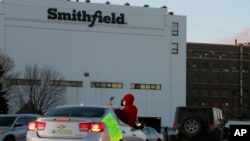When Seblewongel Alemu learned Thursday that she would get a $5-an-hour pay hike upon returning to the South Dakota pork processing plant where she likely had contracted COVID-19, she greeted the news with just a trace of enthusiasm.
“What matters the most is our health,” she told VOA by phone, not long after receiving a local union’s text message about the new incentive at the Smithfield Foods plant in the city of Sioux Falls. Now recovering, Seblewongel added, “It is important that they put in proper safety measures and we will not be exposed to such danger again.”
The meat-packing plant is one of the nation’s hot spots for novel coronavirus infections. More than 800 of its 3,700 workers have tested positive for the novel coronavirus, the South Dakota Department of Health confirmed, according to the local KELOLAND News site. It said at least two deaths have been connected to the plant.
Smithfield shuttered the plant – which accounts for roughly 5% of U.S. pork production, in the form of bacon, fresh pork, hot dogs, deli and smoked meats – on April 14. On Thursday, the Centers for Disease Control and Prevention (CDC) released a report urging Smithfield to step up efforts to fight COVID-19 so the plant can reopen safely.
CDC makes recommendations
Last week, CDC investigators who visited the plant found that at least one department had fewer workers on its production lines – a result of both illness and intentional social distancing – and had slowed speeds accordingly. Managers said they were installing more hand-sanitizing dispensers plus plexiglass barriers between close workstations.
The CDC report also encouraged Smithfield to take steps such as improving health screening, relaxing sick-leave policies, increasing cleaning and access to handwashing, and improving social distancing. Where assembly line work makes that difficult, it recommends more personal protective equipment.
The report emphasized its recommendations “are discretionary and are not required or mandated by CDC.” It also noted that, while its recommendations were for this specific Smithfield plant, “broader interim recommendations for meat and poultry processing industries are in development.”
Smithfield, contacted at headquarters in the Virginia city for which it’s named, declined VOA’s requests for comment. A representative directed queries to the company’s web page on its COVID-19 response. Neither Smithfield nor the CDC report gave a specific date for reopening the Sioux Falls facility.
Workers at the idled plant are getting two weeks of “shutdown pay” at their standard rate for a 40-hour work week. A deal announced Thursday with Smithfield will bring workers an extra $5 an hour for their basic 40-hour week, effective May 1 through July 31, said a spokesperson for the United Food & Commercial Workers International Union’s Local 304A.
Language challenges
Smithfield managers cited communication problems, given “approximately 40 different languages spoken by employees,” CDC investigators found. Their report urged Smithfield to try to overcome those barriers. Gathering demographic information could “provide a better understanding of what workplace factors may have contributed to the spread of COVID-19 among employees,” the report said.
The plant’s most prevalent languages are English, Spanish, Swahili, Nepali, French and Vietnamese – along with Kunama, Tigrinya, Amharic and Oromo, spoken in Ethiopia and neighboring Eritrea. At least 1,000 of Smithfield’s workers come from those two Horn of Africa countries, said Aschenaki Bekele, chairman of the Ethiopian Collaboration Union in Sioux Falls.
“I work with a lot of immigrants,” said Seblewongel, a fluent English speaker originally from Ethiopia’s capital, Addis Ababa. She joined Smithfield five years ago, shortly after moving to Sioux Falls with her then-husband and their adolescent daughter. She packages processed foods on the night shift, with co-workers who are mostly Spanish speakers and Asians, including Nepalese.
Many immigrants are willing to take on the physical demands of meat packing as they try to advance, several Ethiopian and Eritrean workers in Sioux Falls told VOA, and they appreciate overtime. Production work there starts at $15 an hour, with benefits, according to a Smithfield ad posted in early April.
Employment concerns
But immigrants, like other workers, fear losing their jobs.
“After the outbreak was announced in the U.S., we never stopped working,” Seblewongel said. “I had to keep working without any protective [equipment] in place because I have no other means of income. But we were always afraid we might be too exposed to the virus.”
Kooper Caraway, president of the Sioux Falls AFL-CIO, said workers at Smithfield had “raised the alarm” about COVID-19 risks by mid-March.
“They asked the plant to institute staggered scheduling, to institute temperature checks and secondary screening, to institute social distancing and things like this,” he said. “But unfortunately, the management didn’t take those calls seriously until dozens of workers had already tested positive.”
Caraway also noted that because the Sioux Falls plant has “people from all over the world,” workers “were in a position to be able to identify the plant as a potential hot spot very soon, because they were getting calls” of warning from relatives and friends abroad, in eastern Asia and elsewhere.
Complaints of lax precautions
Halefom Tesfalem, an Eritrean who works as a sanitation department machine operator, contends that Smithfield didn’t take enough precautions – even after the first COVID-19 case was detected. The CDC report said that was on March 24. Halefom tested positive on April 7.
“There was no formal guidance telling us that there were infectious cases and that measures would be taken. There were broader alerts that suggested that we take cautious measures,” he said, suggesting that safeguards such as social distancing and temperature checks began too late. Though workers suspected of infection were told to go home, “others were convening in the cafeteria and other places.”
Halefom said many of the infections in Sioux Falls “are from workers bringing it to their homes.”
After two weeks of isolating at their respective homes, both Seblewongel and Halefom say they are feeling better. Their symptoms are subsiding. Halefom says he’s grateful he didn’t infect any of his three family members. Selbewongel remains fearful of spreading the disease to her daughter – 17-year-old Hanan Mustefa, a high school junior – so she continues to wear a facemask and gloves.
“The last 14 days felt like I was somewhere far away. …I didn’t know if I would come out alive, if I would ever go back to work or if I would ever see my daughter again,” Seblewongel said, describing uncertainties “as painful as the virus.”
Concerns over the pandemic prompted Smithfield Foods to temporarily close two other plants in mid-April: in southeastern Wisconsin and in Missouri. Smithfield is a wholly owned subsidiary of the WH Group Ltd. of Hong Kong, which calls itself the world’s largest pork company.
At least two major U.S. beef packing companies also have suspended operations this month because of COVID-19, the farm journal AgWeb reports. JBS USA closed its plant in Greeley, Colo., after at least two employees died. National Beef Packing Co. halted work at its facility in Tama, Iowa.
This report originated with VOA’s Horn of Africa Service, with Carol Guensburg contributing. Salem Solomon provided translation from accounts in Tigrigna.







